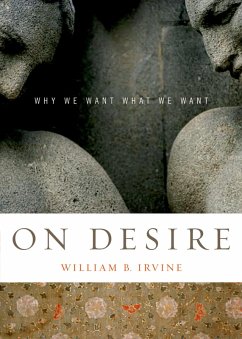
The Nature of Desire (eBook, PDF)

PAYBACK Punkte
17 °P sammeln!
Desires matter. What are desires? Many believe that desire is a motivational state: desiring is being disposed to act. This conception aligns with the functionalist approach to desire and the standard account of desire's role in explaining action. According to a second influential approach, however, desire is first and foremost an evaluation: desiring is representing something as good. After all, we seem to desire things under the guise of the good. Which understanding of desire is more accurate? Is the guise of the good even right to assume? Should we adopt an alternative picture that emphasi...
Desires matter. What are desires? Many believe that desire is a motivational state: desiring is being disposed to act. This conception aligns with the functionalist approach to desire and the standard account of desire's role in explaining action. According to a second influential approach, however, desire is first and foremost an evaluation: desiring is representing something as good. After all, we seem to desire things under the guise of the good. Which understanding of desire is more accurate? Is the guise of the good even right to assume? Should we adopt an alternative picture that emphasizes desire's deontic nature? What do neuroscientific studies suggest? Essays in the first section of the volume are devoted to these questions, and to the puzzle of desire's essence. In the second part of the volume, essays investigate some implications that the various conceptions of desire have on a number of fundamental issues. For example, why are inconsistent desires problematic? What is desire's role in practical deliberation? How do we know what we want? This volume will contribute to the emergence of a fruitful debate on a neglected, albeit crucial, dimension of the mind.
Dieser Download kann aus rechtlichen Gründen nur mit Rechnungsadresse in A, B, BG, CY, CZ, D, DK, EW, E, FIN, F, GR, HR, H, IRL, I, LT, L, LR, M, NL, PL, P, R, S, SLO, SK ausgeliefert werden.













